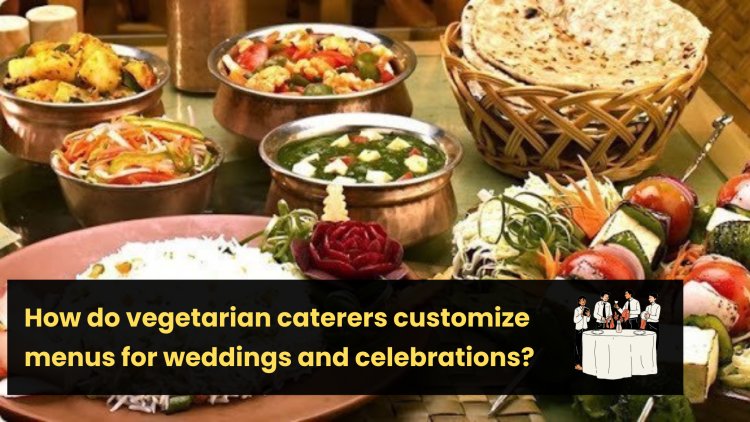How do vegetarian caterers customize menus for weddings and celebrations?
Vegetarian catering for weddings and celebrations has gained popularity as more individuals adopt plant-based diets for ethical, health, or environmental reasons.
Share this Post to earn Money ( Upto ₹100 per 1000 Views )

Introduction:
Vegetarian catering for weddings and celebrations has gained popularity as more individuals adopt plant-based diets for ethical, health, or environmental reasons. Catering to these preferences without compromising flavor, variety, or presentation requires creativity and precision. Vegetarian caterers excel in crafting menus that not only respect dietary preferences but also elevate the culinary experience, ensuring every guest is delighted. Here’s how they customize menus for these special occasions.
Understanding the Client's Vision and Needs:
The first step for vegetarian caterers is a detailed consultation with the client. This involves understanding the theme, cultural background, dietary restrictions, and personal preferences. For weddings, caterers consider the couple’s heritage, favorite cuisines, and even their shared food memories. For instance, an Indian wedding might include a variety of richly spiced dishes like paneer tikka and dal makhani, while a Western celebration might feature grilled vegetable platters and gourmet pasta.
Caterers also inquire about the guest list, identifying dietary requirements such as veganism, gluten intolerance, or allergies. This ensures that the menu accommodates everyone without the risk of cross-contamination.
Incorporating Regional and Seasonal Ingredients:
Vegetarian menu planning relies heavily on seasonality and locality. Using fresh, locally sourced ingredients enhances the flavor and nutritional value of dishes while supporting sustainable practices. Caterers often highlight seasonal produce in their offerings, such as pumpkin and butternut squash dishes in the fall or refreshing watermelon and cucumber salads in the summer.
Regional influences are another way caterers add a personalized touch. For example, a Mediterranean-inspired menu might include falafel, hummus, and tabbouleh, while an Asian-inspired feast could feature tofu stir-fries, sushi rolls, and miso soup.
Offering Diverse and Creative Options:
Vegetarian caterers go beyond the traditional salad-and-soup stereotype. They craft diverse menus with appetizers, entrees, and desserts that excite the palate. Fusion dishes, such as avocado sushi rolls or lentil-based shepherd’s pie, are popular for adding an innovative twist to classic recipes. Additionally, caterers often include interactive food stations, like build-your-own taco bars or customizable pasta stations, to make the dining experience more engaging.
Adapting to Cultural Traditions:
For culturally significant celebrations, vegetarian caterers incorporate traditional recipes and cooking techniques. In Indian weddings, vegetarian menus often include a rich array of dishes like biryanis, curries, and an assortment of breads like naan and puris. Similarly, in Mediterranean celebrations, vegetarian mezze platters featuring dolmas, baba ghanoush, and stuffed peppers are common.
Caterers ensure that these dishes retain their authenticity while meeting modern dietary preferences. For instance, they might create dairy-free versions of classic recipes using nut-based alternatives.
Crafting Show-Stopping Desserts:
Vegetarian desserts are no less impressive. From eggless cakes and mousses to vegan cheesecakes and fruit tarts, caterers ensure a sweet ending to the meal. They also experiment with unique flavors like rose, cardamom, or matcha to make desserts memorable.
Presentation and Thematic Integration:
Beyond taste, presentation is critical. Caterers align the food’s appearance with the event’s theme, using elegant plating, vibrant garnishes, and creative serving styles. For instance, an outdoor garden wedding might feature rustic wooden platters, while a formal banquet may showcase intricate carvings and decorative elements.
Sustainable Practices:
Vegetarian caterers often emphasize sustainability in their services. By reducing meat consumption, their menus already have a lower environmental impact. Many also use biodegradable packaging, avoid food waste through portion control, and compost leftovers when possible.
Conclusion:
Vegetarian caterers expertly craft customized menus for weddings and celebrations by blending culinary creativity, cultural traditions, and personalized touches. They prioritize quality ingredients, innovative recipes, and stunning presentations to create dishes that cater to diverse dietary preferences. From incorporating regional flavors to crafting interactive food stations and show-stopping desserts, their offerings ensure a delightful experience for all guests. With a focus on flavor, sustainability, and inclusivity, vegetarian caterers leave guests with satisfied palates and unforgettable memories of the celebration.















